With the deadline to file updated returns for the financial year 2020-21 (FY21) fast approaching, taxpayers are urged to take note of the essential guidelines. The updated Income Tax Returns (ITR) must be filed by March 31, 2024, as mandated by Section 139(8A) of the Income Tax Act, pertaining to the assessment year 2021-22.
According to experts, taxpayers are not subject to penalties or additional fees for filling the ITR-U. However, they must settle any additional taxes as per Section 140B of the Income Tax Act.
The concept of updated returns, introduced in the Union Budget 2022, aims to streamline the tax filing process and ensure accuracy in financial disclosures.
Who Needs to File ITR-U?
The window for filing ITR-U extends to those taxpayers who have either submitted their ITR on time, belatedly, or even revised it, within 24 months from the end of the relevant assessment year. Notably, ITR-U cannot be utilised to claim a tax refund.
Individuals who failed to file returns for FY2020-21 or wish to update them with additional income must act promptly before the March 31 deadline.
When to File an ITR-U?
An ITR-U can be filed under various circumstances, including instances where the original return was misplaced, deadlines for belated or revised returns were missed, undeclared income needs correction, incorrect heads of income were chosen, or taxes were paid at inaccurate rates.
Additional Tax Implications
While there are no penalties for filing ITR-U, taxpayers are liable for additional taxes. If filed within 12 months from the end of the relevant assessment year, a 25% additional tax on the tax dues applies. This percentage increases to 50% if filed within 24 months.
Benefits of Timely Filing
Filing ITR-U within the stipulated timeframe aids taxpayers in rectifying errors, thereby reducing tax liabilities and penalties. Moreover, it shields them from potential scrutiny or audits by the Income Tax department in the future. Failure to submit tax returns by the end of the relevant assessment year may result in fines of up to ₹ 10,000.
According to Alay Razvi, partner at Accord Juris LLP, ‘It is also an opportunity for individuals to declare any income that might have been missed due to oversight. In short, it helps avoid any further legal tax notices and disputes.’
Process of Filing Updated ITR
To file an updated return, taxpayers must utilise the ITR forms designated for the respective assessment year alongside the newly introduced form ITR-U. The tax payable for an updated return encompasses total income tax liability, including tax dues, interest, late filing fees, and additional tax. The net tax liability is calculated by subtracting TDS/TCS/advance tax/tax relief from the total income tax liability.
With the deadline looming, taxpayers are encouraged to take advantage of this opportunity to ensure compliance with tax regulations and avoid potential penalties.



